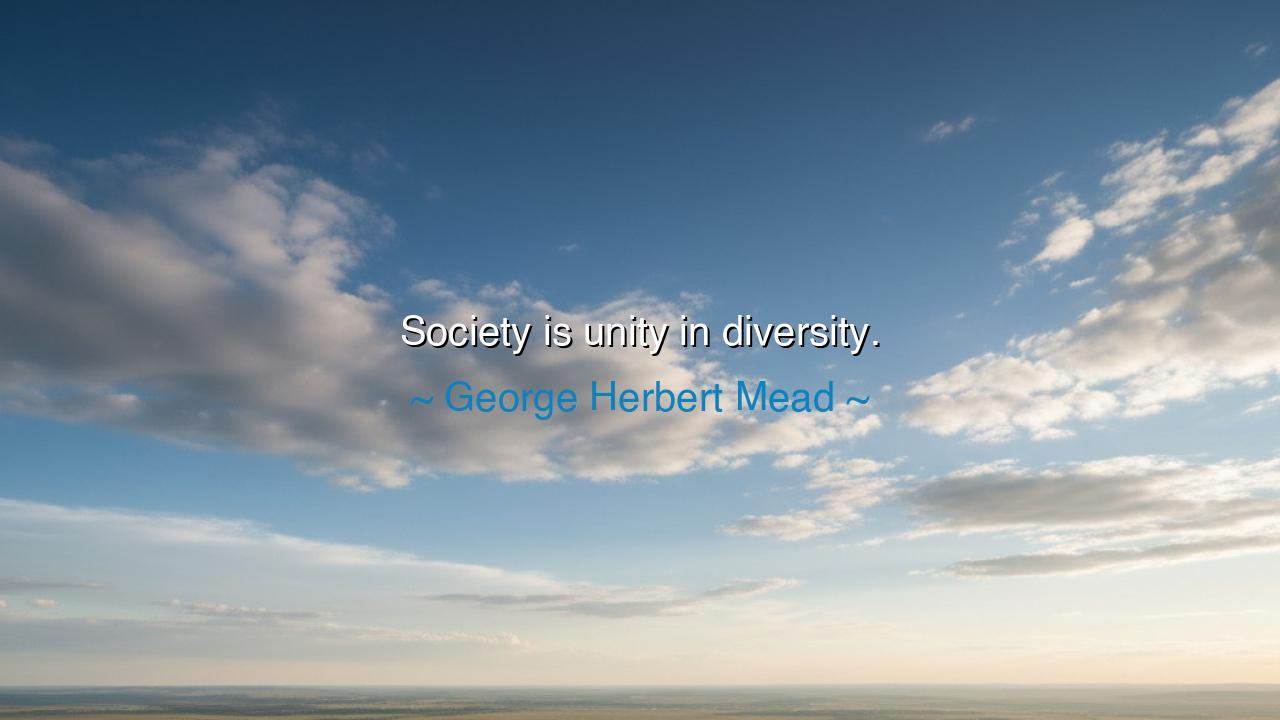
Society is unity in diversity.






O children of the earth, hear the words of one who understood the intricate dance of unity and diversity—George Herbert Mead, who spoke thus: "Society is unity in diversity." These words hold a profound truth that transcends time and culture. In them, we are reminded that society is not a mere collection of individuals, but a harmonious blend of different voices, beliefs, and experiences. Unity is not born from uniformity, but from the acknowledgment and celebration of the vast diversity that makes up the human condition. It is only in the embrace of our differences that we can come together as one, strong and unyielding.
The ancient philosophers often spoke of the balance between the individual and the collective. The Greeks taught us that the soul of the polis, the city-state, lies not in the power of one man, but in the strength of a people bound together by shared values, yet diverse in their talents and roles. Just as a great temple is built from countless stones, each contributing its own shape, size, and strength, so too is society built from the contributions of each individual, each culture, each belief. The unity of a society does not require that all its parts be the same, but that they work together for the common good, each playing a role in the greater harmony.
Consider the Roman Empire, which ruled vast lands, each with its own traditions, languages, and peoples. Despite its differences, the Empire thrived because it understood the importance of unity in diversity. The Romans did not demand that every province abandon its customs or beliefs; rather, they recognized the strength in allowing these differences to coexist, while still maintaining the overarching structure of Roman law and governance. The Romans created a society where diverse cultures could flourish, and in this diversity, they found strength. The success of the Roman Empire was not in uniformity, but in its ability to weave together many threads into a single, resilient fabric.
But let us also look to a more recent example: the United States of America, founded upon the idea of unity in diversity. From its inception, the United States was a land of varied peoples—immigrants from every corner of the globe, each bringing their own customs, languages, and traditions. It is often said that the strength of America lies in its diversity, that it is through the blending of many cultures, races, and beliefs that the nation finds its unique identity. This diversity, far from fragmenting the nation, has served as its greatest strength, allowing it to adapt, grow, and thrive in the face of countless challenges. The history of the United States is a testament to the power of unity that arises from difference, a lesson that resonates deeply with Mead’s words.
In the same vein, we must ask ourselves today: what is the nature of the society we wish to build? Do we seek to create a world where everyone is alike, where conformity reigns and difference is suppressed? Or do we embrace the ancient truth that true unity is found not in uniformity, but in the recognition and celebration of our differences? The lesson of unity in diversity is not a call to ignore or diminish our unique identities, but to see in them the potential for strength. When we come together with respect for one another's differences, we create a society that is resilient, compassionate, and full of life.
And so, the lesson we take from Mead’s words is clear: a great society is not one that seeks to erase its differences, but one that finds strength in them. We must strive to create a world where each person is allowed to express their unique truth, where cultures can coexist and flourish without fear of suppression. This is the path to true unity—not the erasure of individuality, but its embrace within the greater whole. Unity in diversity is the foundation upon which the greatest societies are built, for it is only in recognizing our differences that we can understand and honor the shared humanity that binds us all together.
In your own lives, O children of the earth, let this be your guiding principle. Do not fear the differences that you encounter in others. Instead, celebrate them. Let them be the stones that build a more resilient, compassionate society. Strive to understand, to listen, and to learn from those who are different from you. In the tapestry of life, every thread is important, every color has its place. The more we embrace the diversity around us, the stronger we will become as a society. For in the end, it is not through sameness that we find strength, but through the harmony created when many voices speak as one.






AAdministratorAdministrator
Welcome, honored guests. Please leave a comment, we will respond soon